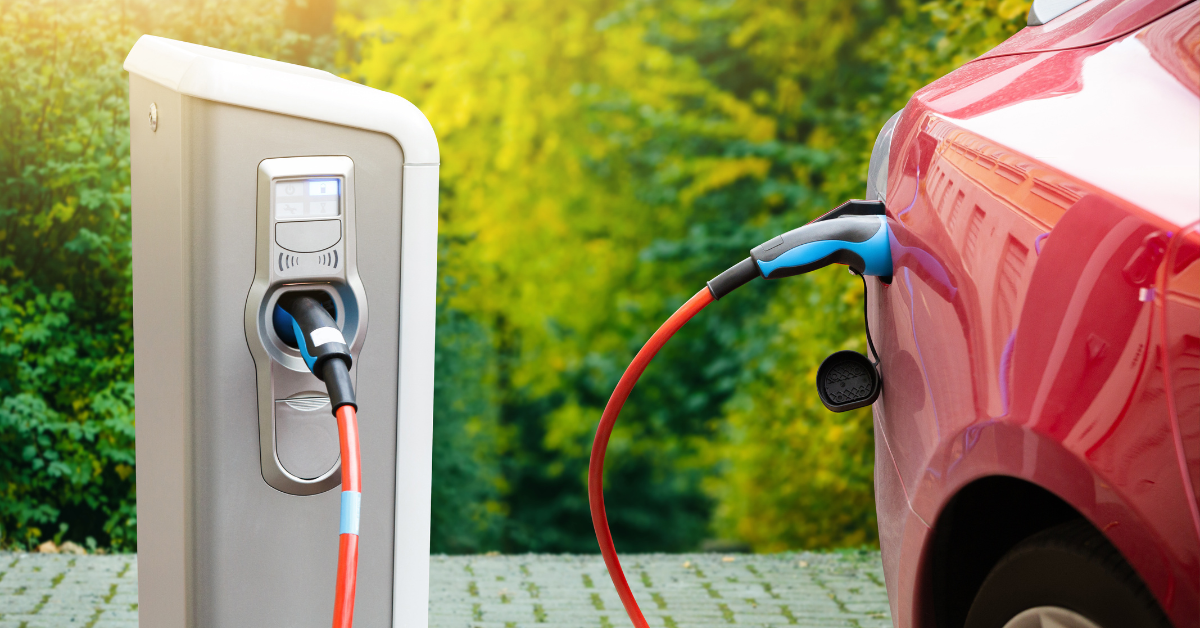Electric vehicle (EV) adoption is accelerating, and so is the demand for charging infrastructure. But have you ever wondered—where do EV charging stations get their electricity from? Whether you’re considering installing an EV charger for your business or simply curious about how charging stations are powered, this blog breaks it all down.

How Does an EV Charger Work?
Before we dive into the electricity sources, let’s briefly explain how an EV charger works.
EV chargers supply electricity to a vehicle’s battery via specialized plugs. Most electric vehicles on the road today use Level 2 chargers, which deliver 240 volts of power. This is 2x the power you’d find in a standard 120 volt.
When connected to a power source, electricity goes through these plugs and charges the electric vehicle’s battery.
The most common types of chargers are:
- Level 1 chargers (120V) – Standard household outlet, slow charging
- Level 2 chargers (240V) – Faster, common in homes and businesses
- Level 3 (DC Fast Charging) – High-speed commercial charging stations
For a full breakdown, check out The Three Levels of EV Charging Stations & How to Choose the Right One.
Now that we know how an EV charger works let’s look at the different ways it can be powered.
What Powers EV Charging Stations?
1. The Electric Grid (Most Common Source)
The most common charging station source is the electric grid.
The electric grid is the network of power lines and plants that generate electricity for homes and businesses.
When a charging station is connected to the grid, it draws electricity from the power lines and converts it into the direct current (DC) needed to charge an EV battery.
One advantage of this setup is that it provides a consistent and reliable source of power, which is essential for drivers who need to charge their vehicles on a regular basis. Another advantage is that it does not require special equipment or permits, as the charger simply taps into the existing electrical infrastructure.
Learn more about the ROI of EV charging stations for commercial properties: EV Charging Station ROI: Maximize Your Investment.
2. On-Site Solar Panels
The second most common power source for charging stations is on-site solar panels.
Solar panels are a renewable energy source that generate electricity from sunlight.
When solar panels are used to power a charging station, the electricity generated is stored in batteries and then converted into DC when a driver needs to charge their vehicle.
Solar panels are becoming an increasingly popular option for powering charging stations because they are environmentally friendly and can help save money on utility bills. However, solar panels can be more expensive to install than grid-connected charging stations, and they may not generate enough electricity to power the station during times of low sunlight.
Wondering if home EV charging is worth it? Read: Is It Worth Getting a Tesla Charger at Home?.
3. Wind & Renewable Energy
Many utilities in Colorado offer renewable energy programs, allowing businesses and homeowners to charge their EVs with wind or hydroelectric power.
For businesses, vehicle-to-grid (V2G) technology allows bidirectional energy flow, turning EVs into mobile energy storage units.
Learn more about V2G tech: The Game-Changer in Vehicle-to-Grid Charging (V2G).
How Much Does it Cost to Charge an EV in Colorado?
The cost of charging an EV depends on electricity rates and the charger type:
- Colorado’s average electricity rate: $0.12 per kilowatt-hour (kWh)
- Charging cost for a 60 kWh battery (~200-250 miles range): ~$7.20
- Public fast chargers: $0.25–$0.69 per kWh, depending on speed and provider
For detailed cost estimates, visit: EV Charger Installation Cost in Colorado.
Why Installing EV Chargers is a Smart Investment for Businesses
Installing EV charging stations on your property provides:
- Increased property value – Attracts tenants and customers
- New revenue opportunities – Monetize charging stations
- Tax incentives & rebates – Reduce installation costs
- Sustainability benefits – Improve environmental impact
Learn more about how EV Charging saves you money in the long run by downloading our free resource, Increasing Your Bottom Line with EV Charging Stations.
Ready to Install an EV Charging Station?
At Mac Electric & Lighting, we provide expert EV charger installation for businesses, HOAs, and residential properties across Colorado.
Get a Free Quote Today: Request a Quote
Explore Our EV Charging Solutions: EV Charging Stations
Residential EV Charging Options: Learn More
Don’t wait—power up your property with EV charging today!

